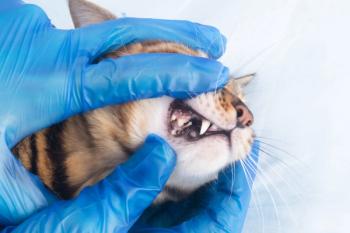
Thyroid storm and unusual manifestations of feline hyperthyroidism (Proceedings)
Clinical signs, clinicopathologic abnormalities, diagnosis, and treatment.
1) Acute thyrotoxicosis
a) Precipitating event
b) Untreated thyrotoxicosis
c) Partially-treated thyrotoxicosis
d) Mortality in humans: 20-50%
2) Clinical signs
a) Accentuated clinical features of hyperthyroidism
b) Hyperpyrexia
c) Diaphoresis
d) Cardiac signs
i) Sinus tachycardia
ii) Cardiac dysrhythmia
iii) Tachyarrhythmias, atrial fibrillation
iv) Congestive heart failure
e) altered mental status; metabolic encephalopathy
i) agitation
ii) emotional instability
iii) seizures
iv) coma
f) vomiting
g) diarrhea
h) dehydration
i) hypovolemia
j) vascular collapse
k) abdominal pain
l) hypertension
m) retinal detachment; sudden blindness
3) Clinicopathologic abnormalities
a) Abnormalities associated with hyperthyroidism
i) Mild erythrocytosis
ii) Macrocytosis
iii) Mature neutrophilia
iv) Elevated liver enzymes
b) hyperglycemia
c) leukocytosis with left shift
d) elevated serum calcium
e) elevated total bilirubin
f) elevated creatine kinase
4) Diagnosis
a) Clinical signs
b) Abnormal thyroid hormone levels
c) Precipitating event
i) Thyroid surgery
ii) Infection, sepsis
iii) 131I therapy
5) Treatment
a) Thyrotoxicosis
i) Methimazole
(1) orally
(2) transdermally
(3) rectally
(4) prevent new hormone synthesis
ii) iodine preparations
(1) block release of preformed hormone
(2) iopanoic acid
(3) potassium iodide
(4) give 1 hour after first dose of methimazole
(5) may delay use of 131I
b) Block effects of hormone peripherally
i) B-blockers
(1) propanolol
(a) may block conversion of T4 to T3
(b) 2.5-5 mg bid-tid
(2) atenolol – 0.25-1 mg/kg po sid-bid
(3) esmolol - Loading dose of 200-500 mcg/kg IV over 1 minute; followed by a constant rate IV infusion of 25-200 mcg/kg/minute
ii) Anti-hypertensives
(1) amlodipine 0.625-1.25 mg/cat sid
(2) benazapril 0.25-1 mg/kg PO sid-bid
(3) hydralazine 2.5 mg PO bid
c) supportive care
i) cooling measures for fever
ii) fluids
iii) 5-10% dextrose
d) identification of precipitating cause
i) treat the cause
6) Other Unusual Manifestations of Feline Hyperthyroidism
a) Neurological
i) Profound neuromuscular weakness
ii) Dementia
iii) Obtundation
iv) Seizures
b) Cardiovascular
i) heart failure
ii) pleural effusion
iii) pulmonary edema
iv) pulmonary hypertension
v) severe hypertensive disease
Table 1
Diagnostic Criteria for Thyroid Storm in Cats
Thermoregulatory Dysfunction
Temperature > 104
Central Nervous System Effects
Seizure
Coma
Hyperesthesia
Extreme agitation
Ataxia/paresis
Altered mentation
Neuromuscular Effects
Neck ventroflexion
Lower motor neuron weakness
Gastrointestinal-Hepatic Dysfunction
Diarrhea
Vomiting
Unexplained hyperbilirubinemia
Cardiovascular Dysfunction
Severe tachycardia
Cardiac arrhythmias
Congestive heart failure
Thromboembolic Disease
Precipitating cause
Impending thyroid storm should be considered if abnormalities as listed above in 3 or more separate organ systems are present. Based upon the Burch and Wartofsky algorithm for diagnosing human thyroid storm.5
Table 2: Medications Used In Thyroid Storm Patients
Newsletter
From exam room tips to practice management insights, get trusted veterinary news delivered straight to your inbox—subscribe to dvm360.



